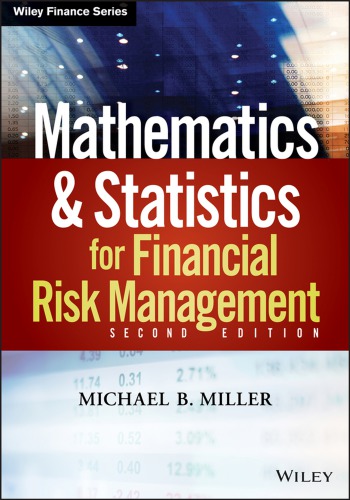

Most ebook files are in PDF format, so you can easily read them using various software such as Foxit Reader or directly on the Google Chrome browser.
Some ebook files are released by publishers in other formats such as .awz, .mobi, .epub, .fb2, etc. You may need to install specific software to read these formats on mobile/PC, such as Calibre.
Please read the tutorial at this link. https://ebooknice.com/page/post?id=faq
We offer FREE conversion to the popular formats you request; however, this may take some time. Therefore, right after payment, please email us, and we will try to provide the service as quickly as possible.
For some exceptional file formats or broken links (if any), please refrain from opening any disputes. Instead, email us first, and we will try to assist within a maximum of 6 hours.
EbookNice Team

Status:
Available4.6
40 reviews
ISBN 10: 1118757645
ISBN 13: 9781118757642
Author: Michael Bernard Miller
Risk professionals, financial engineers, and corporate risk managers looking for FRM exam accreditation, professors and students.
Now in its second edition with more topics, more sample problems and more real world examples, this popular guide to financial risk management introduces readers to practical quantitative techniques for analyzing and managing financial risk. In a concise and easy-to-read style, each chapter introduces a different topic in mathematics or statistics. As different techniques are introduced, sample problems and application sections demonstrate how these techniques can be applied to actual risk management problems. Exercises at the end of each chapter and the accompanying solutions at the end of the book allow readers to practice the techniques they are learning and monitor their progress. A companion Web site includes interactive Excel spreadsheet examples and templates.
Part I: Mathematical Foundations
Chapter 1: Review of Basic Mathematics
Algebra and Functions
Exponents and Logarithms
Solving Equations
Series and Summations
Introduction to Calculus (Derivatives and Integrals)
Multivariable Calculus (Partial Derivatives)
Optimization (Unconstrained and Constrained)
Chapter 2: Linear Algebra for Financial Applications
Vectors and Matrices
Matrix Operations (Addition, Multiplication)
Determinants and Inverses
Systems of Linear Equations
Eigenvalues and Eigenvectors
Quadratic Forms
Applications in Portfolio Theory
Chapter 3: Differential Equations and Stochastic Calculus Primer
Ordinary Differential Equations (ODEs)
Partial Differential Equations (PDEs)
Introduction to Stochastic Processes
Brownian Motion and Wiener Processes
Itô's Lemma (Basic Introduction)
Stochastic Differential Equations (SDEs)
Part II: Probability Theory for Financial Risk
Chapter 4: Fundamentals of Probability
Basic Concepts (Sample Space, Events, Probability Rules)
Conditional Probability and Bayes' Theorem
Random Variables (Discrete and Continuous)
Probability Distributions (PMF, PDF, CDF)
Expected Value, Variance, and Standard Deviation
Chapter 5: Common Probability Distributions in Finance
Discrete Distributions (Bernoulli, Binomial, Poisson)
Continuous Distributions (Uniform, Exponential, Normal)
The Standard Normal Distribution
Log-Normal Distribution (Crucial for Asset Prices)
Student's t-Distribution
Chi-Squared Distribution
F-Distribution
Chapter 6: Multivariate Probability and Copulas
Joint, Marginal, and Conditional Distributions
Covariance and Correlation
Multivariate Normal Distribution
Introduction to Copulas (Capturing Dependence)
Applications in Portfolio Risk and CDOs
Part III: Statistical Foundations for Financial Risk Management
Chapter 7: Descriptive Statistics
Measures of Central Tendency (Mean, Median, Mode)
Measures of Dispersion (Range, Variance, Standard Deviation, Skewness, Kurtosis)
Quantiles and Percentiles
Data Visualization (Histograms, Box Plots)
Chapter 8: Inferential Statistics: Estimation and Hypothesis Testing
Sampling Distributions
Central Limit Theorem
Point Estimation and Confidence Intervals
Hypothesis Testing (Null and Alternative Hypotheses, Type I and Type II Errors, p-values)
Common Statistical Tests (t-tests, z-tests, Chi-squared tests)
Chapter 9: Regression Analysis
Simple Linear Regression
Multiple Linear Regression
Assumptions of Linear Regression
Interpreting Regression Output (R-squared, Coefficients, p-values)
Dummy Variables
Applications in Factor Models and Risk Premia
Chapter 10: Time Series Analysis
Characteristics of Financial Time Series (Stylized Facts)
Stationarity
Autocorrelation and Partial Autocorrelation
AR, MA, ARMA, ARIMA Models
Unit Roots and Cointegration (Basic Introduction)
Applications in Forecasting and Volatility Modeling
Part IV: Applications in Financial Risk Management
Chapter 11: Value at Risk (VaR) and Expected Shortfall (ES)
Definition and Calculation of VaR (Historical, Parametric, Monte Carlo)
Properties and Limitations of VaR
Expected Shortfall (Conditional VaR)
Backtesting VaR Models
Chapter 12: Volatility Modeling
Historical Volatility
Implied Volatility
ARCH and GARCH Models (Basic Concepts and Application)
Exponentially Weighted Moving Average (EWMA)
Chapter 13: Risk Measurement and Management
Credit Risk (Probability of Default, Loss Given Default, Exposure at Default)
Market Risk
Operational Risk
Stress Testing and Scenario Analysis
Regulatory Frameworks (Basel Accords - quantitative aspects)
financial mathematics textbook
mathematics and statistics for financial risk management
financial mathematics textbook pdf
financial math book
financial math book pdf
Tags: Michael Bernard Miller, Mathematics, statistics